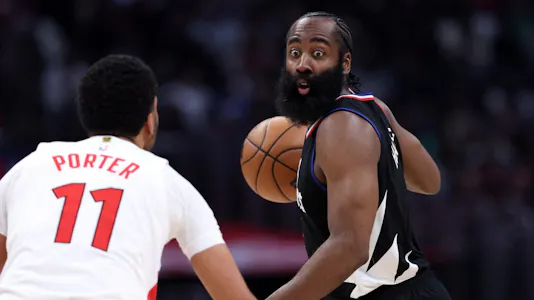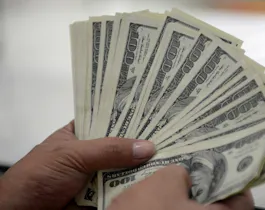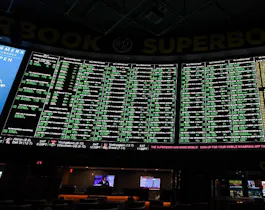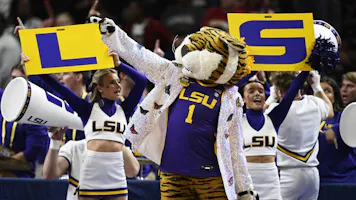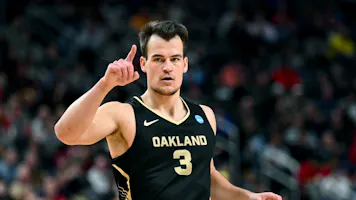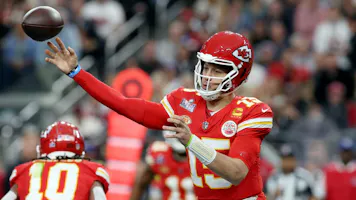
Missouri Hits 300,000 Signatures for Sports Betting Initiative
The Winning for Missouri Education campaign announced that 300,000 signatures have been gathered in support of a legalized sports betting platform.
by James Bisson

More Sports
Who is the Next Women's Sports Mega-Star?
As the popularity of women's sports continues to surge world-wide, we ask the question: Who is positioned to become the next female sports superstar?
by James Bisson

New Jersey Has Fourth-Best Sports Betting Month Ever In March
New Jersey has reported its March sports betting financials, and things were largely positive for the Garden State. One shocking sportsbook had a particularly good month.
by James Bisson

North Carolina Has Huge First Month of Legal Sports Betting
The sportsbook financials are in for the first 20 days of action in North Carolina, and the numbers are quite impressive.
by James Bisson

Shohei Ohtani Betting Scandal Update: Ex-Interpreter to Plead Guilty
Shohei Ohtani's former interpreter is expected to plead guilty to bank fraud and illegal gambling charges, while the superstar appears to be in the clear.
by James Bisson

March Madness Proves Beneficial for Maryland Sportsbooks
March Madness was available to Maryland sports bettors for the first time in 2024, and the financials returned from their sportsbooks show that it was beneficial.
by James Bisson

Is New Jersey In Line to Ban College Prop Betting?
It looks like New Jersey may be the next state to join the list of those that have banned college player prop betting.
by James Bisson

DraftKings and NYRA Team Up in Sponsorship Deal
DraftKings has teamed up with the New York Racing Association to become a title sponsor for numerous races at Saratoga
by James Bisson

Colorado Sports Betting Revenue Drops More Than 50% Month-Over-Month in February
Colorado followed the nationwide trend in February with major month-over-month declines, but things are going well in the Centennial State year-over-year.
by James Bisson

Fanatics Going Live in Illinois
We have all the details surrounding the upcoming launch of Fanatics sportsbook in Illinois.
by James Bisson

Louisiana Latest State to Ban College Player Prop Betting
Louisiana has become the latest state to ban college player prop betting, and we've got all the details about the upcoming change!
by James Bisson

Soft2Bet Adds Ontario to List of Global Jurisdictions
Soft2Bet has been granted a license to operate in Ontario, and we have the details around the launch of tooniebet.com.
by James Bisson

March Madness Provides Huge Boost For New York Sportsbooks
New York sportsbooks had one of their best weeks ever during the opening week of the 2024 NCAA Tournament.
by James Bisson

Virginia Sportsbooks Report $545.1 Million Handle for February 2024
Virginia sportsbooks financials are in for February 2024, and they match similar results to other states nationwide.
by James Bisson

Nevada Experiences Year-Over-Year Increases in Sports Betting Handle and Revenues
Nevada maintained the nationwide trend by reporting month-over-month dips in February 2024, but hosting the Super Bowl propelled the Silver State to year-over-year revenue boosts.
by James Bisson

Raptors' Jontay Porter Being Investigated in NBA Prop Betting Probe
The NBA is investigating Toronto Raptors center Jontay Porter, who allegedly placed bets on his own performances recently.
by James Bisson

North Carolina Has Good First Week of Legal Sports Betting
North Carolina has reported a strong first week of legal online sports betting following the March 11 launch.
by James Bisson

Is the DC Legal Sports Betting Scene About to Become More Competitive?
Looking at the upcoming changes and the proposals to improve the DC sports betting scene.
by James Bisson

YieldSec Report Details Scope of Illegal Betting Still Existing in America
YeildSec has released a report that details the scope of illegal betting that still exists in America, and the numbers going into the illegal market are staggering.
by James Bisson

Indiana Rides March Madness To Fourth Best Sports Betting Month Ever
Indiana notched one of its best ever sports betting months thanks to March Madness.
by James Bisson

DraftKings Dominates Massachusetts Sports Betting Market in March
Massachusetts sports betting apps and the state's retail providers had their second-best month ever in terms of overall wagering activity in March.
by James Bisson

Pennsylvania Sportsbooks Top $800 Million in Bets in March
The Pennsylvania legal sports betting industry continues to show strength with yet another $800-million monthly handle during March.
by James Bisson

Mississippi Senate Votes To Keep Mobile Sports Betting Off The Table For Now
The Mississippi senate has voted against mobile sports betting for now.
by James Bisson

A Great March For New York Sportsbooks Closed Out a Great Fiscal Year
New York sportsbooks have capped their fiscal year with a great March 2024, as shown in their legal sports betting financials.
by James Bisson

Maryland Pushes on iCasino Legalization This Year
Despite having a legal sports betting scene, Maryland has failed again to capitalize on an opportunity to do the same for iCasinos.
by James Bisson

Fanatics Goes Live in Arizona
Fanatics has continued to make the changeover from PointsBet across the United States, and has officially launched in Arizona.
by James Bisson

Montana Bucks the Trend of Banning College Prop Bets
Montana has gone against the grain when it comes to banning college player props, and we have all the details about its decision to go that route.
by James Bisson

2024 March Madness Mascot Battle Royale: Stasha Reigns as the Greatest of Them All
Which March Madness mascot would emerge victorious in a 64-team, single-elimination battle royale tournament? James Bisson shares the blow-by-blow results here.
by James Bisson

Is Mississippi the Next State to Expand and Adopt Comprehensive Mobile Sports Betting?
Mississippi might be the next state to expand its sports betting operations to include online mobile platforms and apps.
by James Bisson

BetRivers Getting Into the NASCAR Title Sponsor Game
BetRivers sportsbook will get extra exposure as it signs a deal to become a title sponsor with the NASCAR Xfinity Series at Dover Motor Speedway.
by James Bisson

Iowa-LSU Matchup Most Bet Women’s College Basketball Game Ever?
A huge women's college basketball Elite Eight was a boon for our best sportsbook, with Iowa-LSU going down as the most bet women's game ever.
by James Bisson

Prime Sportsbook Launches in New Jersey
Prime Sportsbook has launched in New Jersey, and we have the details about how the Garden State's newest option plans to differentiate from its competitors.
by Philip Wood

Circa Sportsbook Expands Into Kentucky
The sports betting site known for competitive pricing and high limits has moved into its fifth state.
by Zachary Hanshew

Survey Says...Canadians Getting Sick of Sportsbook Adverting
Results from a recent nationwide Canadian survey show residents are frustrated with many aspects of sportsbook advertising.
by James Bisson

Illinois Sportsbooks Set Monthly Revenue Record for Second Straight Time in January 2024
Illinois has finally reported its January 2024 sportsbook financials, and a huge hold rate propelled it to set a second straight monthly revenue record.
by James Bisson

Is a Nationwide Ban on College Player Prop Betting Coming?
Looking at the details surrounding a potential nationwide ban on college player prop betting, a step that has already been taken in some jurisdictions.
by James Bisson

Pennsylvania Sportsbooks Top $800 Million in Bets in March
The Pennsylvania legal sports betting industry continues to show strength with yet another $800-million monthly handle during March.
by James Bisson

Kentucky Sportsbooks Accept a Combined $465.5 Million in Wagers in January and February
Kentucky sports betting financials have been submitted for January and February 2024, and we have all the details.
by James Bisson
SBR's Betting & iGaming Journalists
Our expert writers, analysts and sportsbook reviewers have 100s of years experience between them in the sports betting and iGaming industries. Since 1999, SBR has been a trusted source of industry expertise and betting advice. We continue to be your trusted source for betting picks, news, up-to-date betting odds, and (of course) the best sportsbook and online casino reviews anywhere.
Regional Developments & Updates
Online sports betting can differ between regions. SBR offer the latest insights and scoop on developments and updates specific to your region below.
North Carolina sports betting is also launching on March 11, 2024 so keep an eye on expected North Carolina sports betting apps and North Carolina sportsbook promo codes.
U.S. States News
Keep informed about the state of online sports betting in these states:
